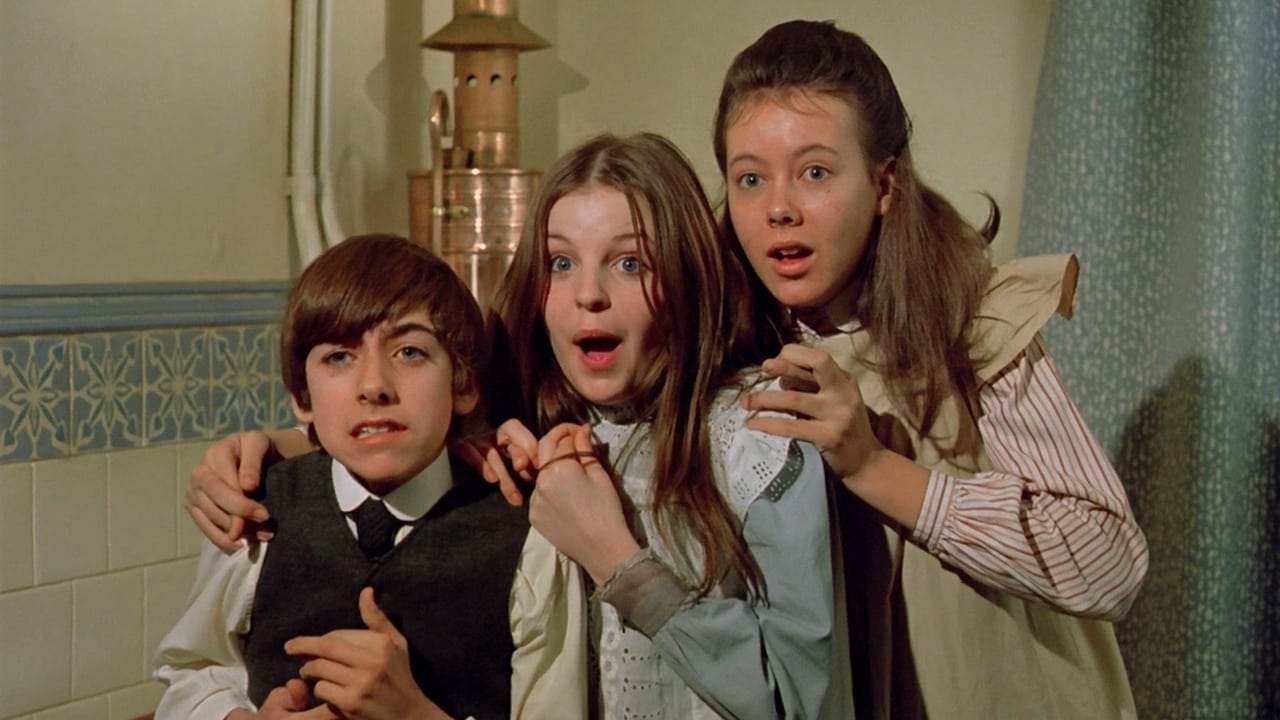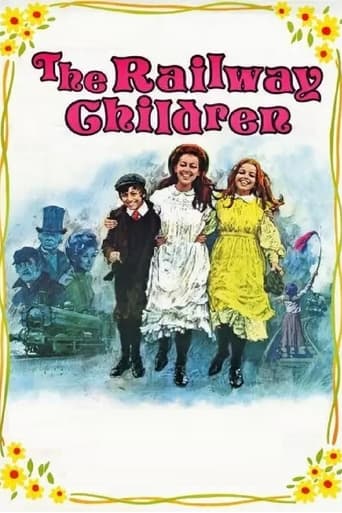Matrixston
Wow! Such a good movie.
NekoHomey
Purely Joyful Movie!
ReaderKenka
Let's be realistic.
Sienna-Rose Mclaughlin
The movie really just wants to entertain people.
dougerooo
Other reviewers covered everything great, about this movie. I saw it once, on broadcast TV, even before the advent of video tape,, and always wanted to own it. In the ensuing forty seven years,,, for some reason, it has NEVER been available in America; Region 2 - England - only. The Big Questions is -- WHY?? Why doesn't a multi-national outfit like Amazon, have an American format for this DVD? WHY???
Rickting
In The Railway Children, a family move to the countryside after their father is wrongfully arrested and while trying to find out what happened to him, the children have adventures on the railway. I as doubtful about this one having seen a dreadful stage version of the story many years ago, but this certainly was a lot better than that. TRC is a children's film that both adults and children can enjoy. It's slightly dated inevitably and inevitably feels a bit sugary, however it manages not to drown itself in syrup like so many other of its kind. Railways have rarely looked cooler and while the adventures are thrilling, well directed and the story has heaps of charm, there's also a moving, more grown up storyline about their father. Therefore, this is a film with a universal appeal and that is why it's a classic. It's likely the best British children's film of all time and mostly it's aged very well.Although 2 of the 'children' are actually in their early 20s, the acting is all around good and Bernard Cribbins is a treat. It's well directed too and it's a shame Lionel Jeffries didn't do more directing. The cinematography fills the film with excitement and also conveys a sense of childlike wonder. The story/screenplay are what makes the film, and it manages to be charming and sentimental without grating songs, talking animals, fart and poop jokes, terrible child actors, pathetic audience manipulation and heaps of clichés like 90% of other children's films. The ending, when the father returns, is a Bambi style tear jerker that won't leave a dry eye in the house. TRC is a very good children's film overall, which although not targeted at me I could still appreciate and it's the rare children's film which I'm actually genuinely happy to watch. A superior kids movie and it's great this came out of Britain. A must for families wanting a break from DreamWorks factory products and railway lovers.9/10
robert-temple-1
I recently saw this again, having a few months before seen the live production of the play at Waterloo Station in London, which was a wonderful experience. The old Eurostar platforms are not in use for trains and passengers at the moment, so the performance is given on the platforms, and a live steam train actually chugs up the tracks in front of the audience during the story. It is highly recommended, and a joy for all children. This is more than just a children's' classic, however. It is for people of all ages who like a story about a more wholesome and innocent age than the corrupt and decadent one in which we now live. Based on the famous book by E. Nesbit, the screenplay was written by the actor Lionel Jeffries, who also directed the film. It was a labour of love, which shows in every frame. The film is beautifully photographed by our old friend the late Arthur Ibbetson, with Paul Wilson as his operator. It is one of the best jobs that Arthur ever did in his long career. The mother is played by Dinah Sheridan, who as an ingénue played 'Steve' in SEND FOR PAUL TEMPLE (1946, see my review). She is just right for the part, combining the stiff upper lip with warm and deep sympathy and a stoical character in times of adversity. This film was a runaway hit at the box office in 1970, a year in England famous for its spectacularly warm and endless summer, a summer which I spent largely on Primrose Hill. For the past 41 years, this film has never lost its appeal to families and children and those adults who are sentimental by nature. The oldest girl of the family is played by Jenny Agutter, a role which made her famous in England at an early age. In terms of acting, however, Sally Thomsett takes the prize. Agutter went on to appear in 106 films, attracting great admiration, whereas Thomsett, who only appeared in 31 (mostly television, and a lot of comedy), could more appropriately be said to have endeared herself to the British public as a kind of household pet because of her mischievous charm. Bernard Cribbins shines as Mr. Perks, the station master. He has also been a great British favourite (94 titles). Gordon Whiting plays the Russian novelist, but we really don't see enough of him, indicating that the script was cut, as much more is made of him in the play at Waterloo. Beatrix Mackey plays Aunt Emma, but she appears so briefly and meaninglessly that there was really no point in having her. Presumably this also suggests that cuts were made in the film as released. (I wonder what a 'director's cut would look like?) Deddie Davies does very well as Mrs. Perks. William Mervyn looks exactly right as the Old Gentleman, especially when waving benignly from the train. The casting for this classic was certainly spot-on. This film is of timeless appeal to all good folk, but especially those who are still enwrapped in the golden dream of childhood. These laurels are certainly sufficient for Lionel Jeffries to rest on, although he also has so many others.
L. Denis Brown
The book "The Railway Children" is a children's book published in 1906 by Edith Nesbit, an early British socialist who had very strong views about the importance of family values for the upbringing of children, and the story it told was presumably intended to be contemporary. Somewhat surprisingly, it seems to retain a significant appeal for today's children a hundred years later.A film adaptation of an Edwardian classic children's story with the principal roles those of the children, does not sound very exciting to most film-goers in this day and age. But a really great performance by Jenny Agutter who (near the start of her long and distinguished acting career) played the part of the oldest girl Roberta (Bobby), combined with remarkable work by the script-writer and director Lionel Jeffries and outstanding photography by Arthur Ibbetson, have made this a film that is still not to be missed, and one which most of its viewers find quite memorable. It is remarkable that this book, set in the year 1905, was filmed five times between 1951 and 2000, (four of them by the BBC for British television), and all of these versions are not only still greatly admired but also very highly regarded (something that user comments on this database will confirm), even though this may seem almost inconceivable for a nostalgic period story designed to appeal primarily to children. Since I have not seen the four BBC TV versions, these comments relate exclusively to the 1970 film version produced for showing in cinemas. Unlike most films of children's books, 'The Railway Children' may appeal more to adults than to children. The structure of family life has changed so much in the last century that many children may feel totally lost by the way in which it is depicted in the film, whereas many older adults may find it has a considerable nostalgic appeal. Perhaps compensating for this, the children featured in the film are full of life and vitality, whilst the adult characters although well rounded tend to mostly be 'stuffed shirts'. The story is a mature one, which deals with love, support and encouragement, it is not only timeless but capable of appealing to all ages. It can fairly be described as sentimental and more than a little idealised, but it is never in any way mawkish, and that rarely justified adjective 'uplifting' fits it like a glove.Spoiler Ahead.The film starts with its upper middle class Edwardian family celebrating Christmas in a comfortable and fairly spacious London home when two unexpected visitors call and take Father (who is a senior government officer) away with them. Mother has to move to a very small cottage alongside the railway in a remote part of Yorkshire and the children gradually build a new life mainly associated with the railway and the few trains that pass. This life proves quite eventful in small ways and the elder daughter Bobby grows up rapidly as she takes over more responsibilities from her mother. At one point she averts an accident to the train when her sharp eyes spot that a landslide has created a natural hazard. Father's story is never given much emphasis, but he is never forgotten and it gradually becomes apparent that he is incarcerated and suspected of treason. Finally these suspicions are cleared up (we are not told how or why) and he reappears unexpectedly at the local station to rejoin his family.For many years this film was not available in any home video format in North America, but Anchor Bay created a DVD from it three years ago, so they clearly recognised that this quite simple film has not yet lost its appeal. For anyone who has not got one already, I would very strongly recommend rushing out to buy a copy of this DVD whilst it is still available - you would be most unlikely to be disappointed unless you have become totally cynical, or your minimum requirements for a film include buckets of blood and/or intense sex scenes.

